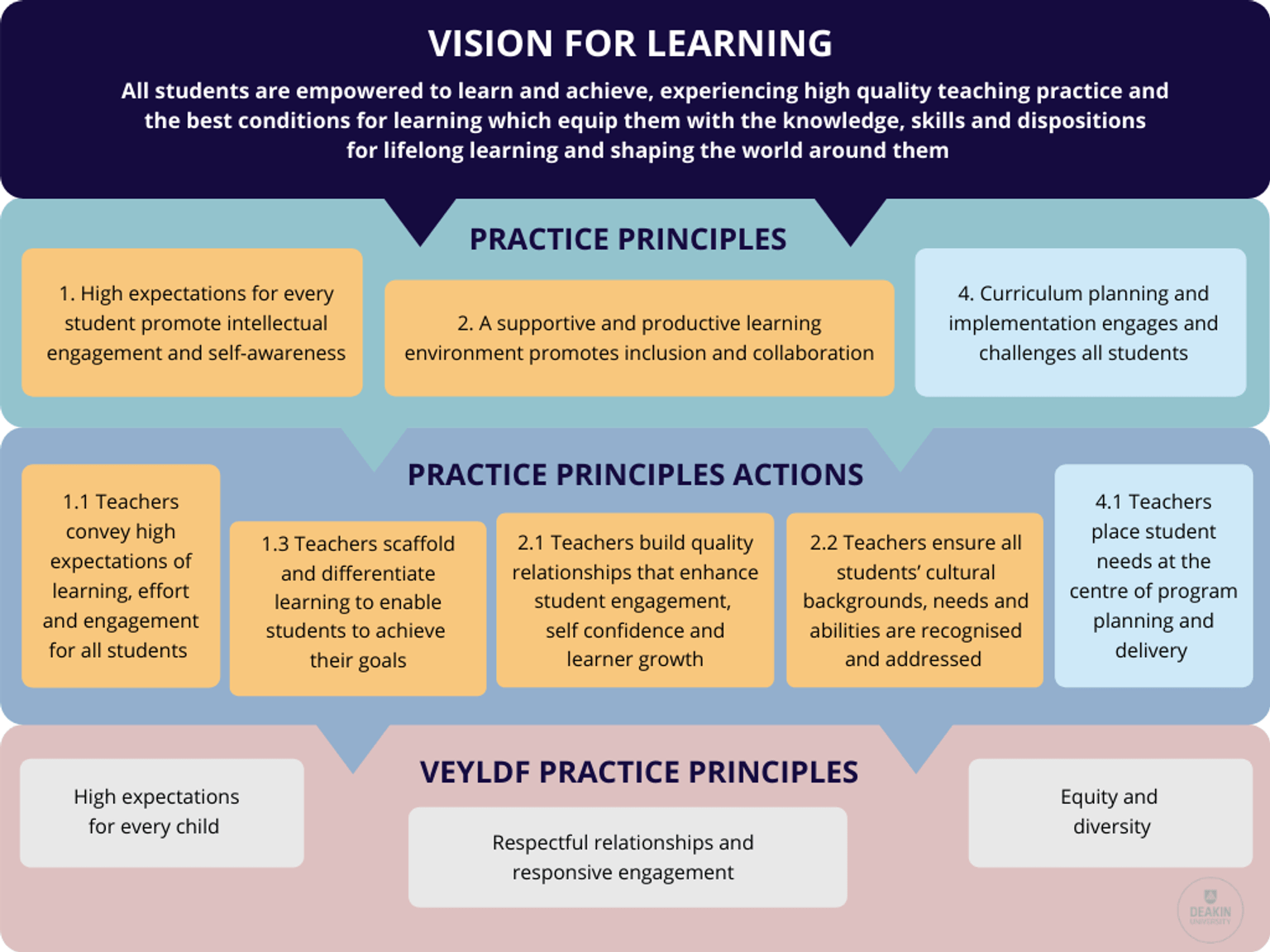We acknowledge all Aboriginal and Torres Strait Islander peoples as the first sovereign people of this land.
As a community of educators we recognise with deep respect their continuing connections to lands, waters, knowledges and cultures. In doing so we pay our respects to their Elders past, present and emerging.
What is play-based and inquiry learning?
Objectives of the module
This online module will deepen teachers' understanding of play and inquiry and how they support children's learning, wellbeing and social skills. At the completion of this module, teachers will be able to observe children's play and inquiry activities and identify the learning that is occurring and how it can be linked to curricular outcomes.
Recognising your current expertise and practices
Many of you may already be implementing a play-based and inquiry approach. These modules will provide further information to support your understandings and practices. For some this will be confirmation of your practice. For others, it provides a new way of viewing teaching and learning. We trust that you will see the benefits of play-based and inquiry learning in the early years of schooling.
"The more that I look for opportunities to incorporate play-based learning the more confident I am becoming... I find that it is such an important aspect of the students learning and I love that through play I can differentiate and cater to the needs of my students." (2021 professional learning program participant)
What is play-based and inquiry learning?
Play-based learning uses children’s natural motivation to play as a context for learning. During play, students inquire and learn using their imagination to explore, experiment, discover, collaborate, improvise and create.
The Victorian Early Years Learning and Development Framework (VEYLDF) (DET, 2018) highlights that the cognitive processes used by students in play, stimulate and integrate a wide range of intellectual, physical, social, emotional and creative capabilities to foster high-level learning.
The importance of play-based and inquiry learning
Louise Paatsch, Professor in early years play, language and literacy at Deakin University, and Natalie Robertson, Doctor in early years play, teaching and learning at Deakin University talk together in the video about the importance of play-based and inquiry learning.
Differentiated teaching through play-based and inquiry learning
Play-based and inquiry learning allows teachers to differentiate and respond to the diverse backgrounds and personal strengths, needs, interests and capacities of their students. In this way, play-based and inquiry learning explicitly supports Strategy 10: Differentiated Teaching of the High Impact Teaching Strategies (HITS)(opens in a new window).
Play-based and inquiry learning provides opportunities for differentiated teaching where students are supported to engage their curiosity and work at a variety of levels, in their own different ways, from a strengths-based perspective.
Differentiated teaching and learning recap
Professor Lorraine Graham's discusses in this video about differentiated teaching and learning which is an essential resource within HITS Strategy 10.
Play-based and inquiry learning is differentiated learning
In a play-based and inquiry approach, learning experiences are adjusted to suit both the process students use to learn, and the product that is expected from them. Learning experiences are tailored and responsive to what is documented, assessed and known about the individual student.
Play-based inquiry and learning differentiates the process and product of learning because students choose how they work on a specific concept by selecting experiences available to them in the classroom or outdoor environment This makes it possible to work at their own levels of proficiency. The guidance and feedback given to the children during their play-based and inquiry learning experiences helps to extend their learning.
Teacher's role
The learning process might be adjusted by changing the type of intervention or role that you, as a teacher, have in the student's play and inquiry experience.
For example, for a child who is excelling you may promote more complex methods of inquiry to extend their learning in play and provide more opportunities for collaborative learning with peers.
Other students may require you to provide them with more explicit instruction, modelling and questioning to guide their learning in play.
In any play-based and inquiry learning experience, each student's strengths and interests will provide opportunities for meaningful adjustments to the learning process and product. We will explore the teacher's role in play-based and inquiry learning in more detail in Module 2.
Framing differentiated play-based inquiry learning within your context
Explore the key resources below that show the connection between Victoria's vision for learning, the Practice Principles for Excellence for Teaching and Learning, and the VEYLDF Practice Principles.
Frameworks for teaching and learning
The idea that play-based and inquiry learning provides a form of differentiated teaching is supported by Victoria's vision for learning and practice principles.
The figures above and below this box explore and illustrate some key ways that play-based and inquiry learning supports your practice of excellence in teaching and learning, and the relationship that exists between principles and documents.
If you would like to explore any of these resources more closely, please click the following links:
Keep in mind
We will explore how a play-based and inquiry learning approach can support the learning outcomes of diverse learners and develop inclusive learning communities in schools and classrooms in Module 4.
The theory of play-based and inquiry learning
There is a long history of theories evidencing the strong interconnection between play and learning, particularly in the acquisition of social, emotional and cognitive skills.
This dates to the early theories of Parent's social behaviour theory, Piaget's cognitive developmental theory, psychoanalytic theories and socio-cultural theories.
Research has also identified play to be a vehicle for the learning and development of a wide range of capabilities and skills, such as self-regulation (Vygotsky, 1978; Ivanova, 20000; Hoffman, 2020); language (Smilansky & Shefatya, 1990; Stagnitti and colleagues 2000; 2007; 2009; 2015; 2020); and executive function associated with metacognitive learning processes (Bodrova & Leong, 2007; Karpov, 2005; 2014).
Teacher as player in play-based and inquiry approaches
Contemporary theories, such as socio-cultural theory (Vygotsky, 1978) and cultural historical theory (Hedegaard, 2008; Fleer, 2009; 2011) position the teacher’s role as significant in student’s play experiences, as learning is now considered to be co-constructed. This means creating a collaborative learning environment, where students are acknowledged as capable and agentic learners, and adults extend and promote new learning through their intentional interactions with students in play.
The teacher’s role in linking play and learning
Play has long been demonstrated to hold value in a student’s learning. However, more recent research added the importance of adult interaction in play to maximise the learning potential of play experiences to this understanding.
Teachers must scaffold and support the learning within the student’s play. Play-based and inquiry learning is much more than just having play stations available and freely accessible for students.
Research is increasingly showing that settings where students are predominately left to engage in undirected free play, are the least successful environments for student learning, development, engagement and behaviour (e.g., Robertson, Yim & Paatsch, 2020; Zosh et al., 2018; Sylva et al., 2010; Mashburn, 2008).
Integrated teaching and learning in action
The following video discusses the multiple roles of teachers in student's play within an overview of VEYLDF Practice Principle 7 Integrated Teaching and Learning.
As you are watching this video, pay particular attention to the examples of adult-guided play and learning and think about how you provide opportunities for students to learn through play.
What does play look like?
There are a range of different types of play experiences that teachers can use to structure their play-based and inquiry learning approach. Each type of play has a purposeful role to engage students in meaningful exploration, investigation and imaginative experiences. Different types of play offer multiple opportunities to encounter, engage with, and elaborate on new knowledge and skills with peers and teachers (HIT Strategy 6).
Each type of play has a collective role in supporting student's learning processes, personal and social capabilities, across all areas of the Victorian Curriculum and the VEYDLF learning outcomes.
More than just play stations
Play-based and inquiry learning is about much more than just having play stations available and freely accessible for students. It is about the pedagogy that is used by the teacher to foster, extend and introduce new learning through intentional planned and spontaneous interactions, as well as providing opportunities for these types of play.
Looking closely at different types of play: Possibilities for the classroom
All of the different types of play are valuable to support young student’s learning and development. Often two or more play types are combined to further enhance students learning.
This is especially the case when pretend play is encouraged in classrooms. It challenges your students to:
- think more deeply
- make connections between their learning and prior experiences
- engage more sophisticated metacognitive learning processes
- collaborate with peers and teachers.
A principal's story
As you watch the following video consider the ways in which School Co-Principal Peter Fahey talks about different types of play in relation to student's varying experiences and knowledges.
Reflect and collaborate
We will be focusing more on the adult's role in student's play in Module 2. For now, you may like to read about VEYLDF Practice Principle 7 Integrated Teaching and Learning (pdf - 429kb). As you are reading this guide, reflect upon your own practices in play-based and inquiry learning.
Also, think about how play-based and inquiry learning supports your practice of HITs. You may like to set yourself some teaching goals to work towards throughout this professional learning program.
The following questions can act as a prompt to guide your reflections:
- What types of play do you already support in your classroom?
- Which play types do you feel more comfortable supporting in your classroom and why do you think this?
- How comfortable do you feel providing a play-based and inquiry learning approach?
- How could you engage with students in their play to enhance their learning?
"It took a while to really embed the practice of play based learning and what we have learnt so far is the importance of planning, discussing, reflecting as a team on a regular basis. We are learning more about the different elements of play and how they all fit" (2021 professional learning program participant)
Play-based learning and general capabilities
The link between play and learning is well documented. Accordingly, play-based and inquiry learning approaches provide a meaningful context for student learning and general capabilities (Justice and Pullen, 2003; Korat et al., 2002, 2003; Nicolopoulou et al., 2006).
Let's take a look at some of the ways that play-based and inquiry learning supports student learning and general capabilities:
In summation
As identified by the VEYLDF Integrated Teaching and Learning Practice Principles (pdf - 429kb), teachers "have an important role in developing student's understanding of concepts in literacy, numeracy and science. When adults guide learning, they extend children's learning beyond what they can know, do and understand on their own" (DET, 2007, p. 9).
Making visible the connections to curriculum
Learning occurs across multiple learning areas and general capabilities of the Victorian Curriculum when students are engaged in a play-based and inquiry learning approach.
Watch the below videos to strengthen your ability to identify connections between curriculum and play-based and inquiry learning. Professor Louise Patch and Dr Natalie Robertson will narrate a selection of vignettes to discuss the learning that students engaged with in connection to the Victorian Curriculum.
Keep in mind
These two videos have been filmed in a small group setting outside of the main classroom, to show the interactions between the students and the teacher.
Building community - webinar
Identifying learning through play
The following video presents an excerpt of play by early year's students in a travel agency pretend play scenario. As you watch this video please identify the learning that the students are engaging in by making links to the Victorian Curriculum.
Webinar 1
- Professor Louise Paatsch, whose extensive experience and research has focused on play-based and inquiry learning, talks about the importance of play-based learning.
- A principal, a classroom teacher and an academic share their stories, experiences and challenges in relation to integrating play in the classroom.
Webinar 1: Understanding play and the play-based, inquiry learning approach
Progressing with the differentiated/play-based and inquiry learning program
You've now come to the conclusion of Module 1.
Click below for Module 2: Planning and implementing a play-based and inquiry approach, that explores the teacher's role in play-based and inquiry learning.
Module 2: Planning and implementing a play-based inquiry learning approach
Explore creating supportive environments for the implementation of play-based and inquiry learning for diverse learners.
Updated





